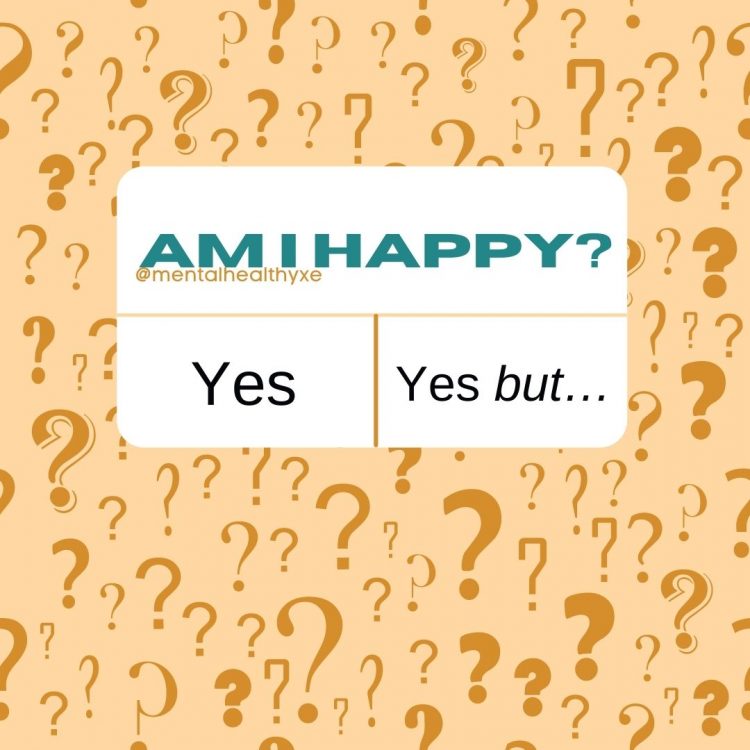Congratulations on starting your dream job, for making a new friend, or for finally perfecting home baked bread! You are amazing!
Yes, cheers are in order!
After all…
You do feel happy…*shifty eyes*…*ominous music*…don’t you?
Ok, I guess we can drop the ruse. Yes, you feel at least a little happiness, but for some reason you also feel awful. And it’s right about at this juncture you ask yourself this question:
I got what I wanted, why can’t I just be happy?
I’m not a mind reader; I know the details of your situation so well because it’s familiar to me too. I’ve asked myself am I a broken human? so often, that I’ve settled on some answers. I’d hazard a guess my thoughts apply to others, especially if you also experience a mental illness or chronic condition. So let’s do this…
The four reasons why you can’t “just be happy.”
1. Stress
The body and mind doesn’t always correctly identify the difference between positive or negative stress. So whether you have a test tomorrow or you won the lottery — your insides can perceive this as overwhelming. That flooding can lead to the various classic stress symptoms as well as trigger or worsen a mental health concern. So, having some happy stress? It could help to do a little stress management, even if that seems out of place for the situation. Your body and mind may just thank you.
2. Routine
Most nervous systems love routine, and likewise a lot of folks with illnesses benefit from the same. When something exciting occurs, it’s not uncommon for our routines to change. When on vacation we may go to bed late, when packing for a move we may forget to eat, while busy being newly in love, we could forget to take our medications. You get the point.
As much as possible try to find ways to keep the same routine during happy times. This isn’t always controllable, but you can attempt to prioritize the things that you know are key to you remaining functional.

3. Happiness or excitement can be a trigger
For some folks these types of feelings can be a trigger due to past trauma or abuse. I know, because this is me.
Folks who have a history of trauma/abuse commonly have to keep their guard up in order to survive. This can mean that the nervous system adapts from the usual order of things, and helps keep an individual safe by changing the baseline towards being disconnected from others. Don’t connect, don’t get hurt (as much or as badly)… makes perfect sense actually. Ergo, happiness, trust, excitement, can all feel scary — even long after a person is safe — because our insides still view these emotions as dangerous.
In this case, I’d suggest: therapy, positive self-talk, and learning about trauma. With time and patience we can learn how to inform our nervous systems that the old way is no longer needed. It certainly doesn’t happen overnight, but as humans we can always change and grow; personally, I’ve improved a lot.
4. Acceptance
How helpful was it the last time someone told you to “just not worry”? Usually not very, and yet we utter similar things to ourselves all the time! Saying; I should be happy isn’t going to magically cause cheery feelings to arrive.
Acceptance can often be learned through meditation, yoga, and similar practices. A therapist would probably help here too. I’ve needed to work on understanding that things which are seemingly contractive can exist at the same time. And they don’t have to cancel each other out or make the other less true. I CAN be thrilled while at a concert and stressed about the drive home after. I can give both space and both are valid.
I’d also like to throw in here that if you find that you never feel much of anything, it’s possible you could be experiencing a symptom that is called anhedonia — which is a whole different thing. It’s typically a symptom of depression or can be a side effect of certain medications. This symptom is about losing the ability to be interested or find fulfillment in anything. You can read my writing on anhedonia, and if it sounds familiar, be sure to discuss it with your healthcare team.
In order to conclude, I’d like to offer you the good news that in my opinion… you are not broken. I’d also like to suggest that you are not ungrateful or a permanent downer. Happiness and success are commonly on a spectrum, and some times that place coexists with a bit of stress, depression, or even fear. Whatever accomplishment you’ve achieved, it is still amazing and all emotions are OK. Truly.
Have you had the experience of a happy moment turning into something else, like stress or sadness? Do these explanations make sense, or would you explain it in another way? Other thoughts? Please share them in the comments below!
If you enjoyed this article, please take a moment to check out some of my other articles here on The Mighty. If you’d like to follow along with my journey, you can find me on Instagram as @mentalhealthyxe.
Getty image by Alexandra Ribeiro / EyeEm

